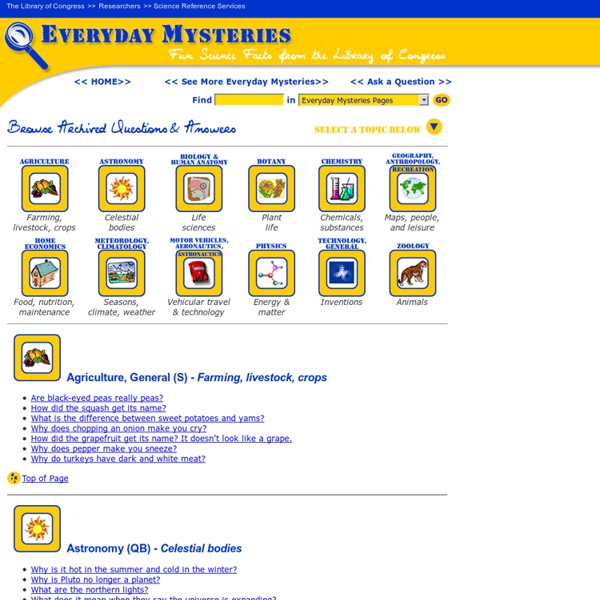



http://www.loc.gov/rr/scitech/mysteries/archive.html
Related: Science ResourcesGiant Pandas Sign up to get panda news from the Zoo. Giant pandas are black and white bears that live in temperate-zone bamboo forests in central China. Among the best recognized—but rarest—animals in the world, they have come to symbolize endangered species and conservation efforts. As few as 1,600 giant pandas survive in the mountain forests of central China. More than 300 pandas live in zoos and breeding centers around the world; most of these pandas are in China.
Predictions made by Ray Kurzweil American author, inventor and futurist Raymond Kurzweil has become well known for predicting the future of artificial intelligence and the human race. His first book, The Age of Intelligent Machines, published in 1990, put forth his theories on the results of the increasing use of technology and predicted the explosive growth in the internet, among other predictions. Later works, 1999's The Age of Spiritual Machines and 2005's The Singularity is Near outlined other theories including the rise of clouds of nano-robots (nanobots) called foglets and the development of Human Body 2.0 and 3.0, whereby nanotechnology is incorporated into many internal organs. Accuracy of predictions[edit]
Ask an Astronomer Below you will find a list of questions that have video answers available. To view a segment, simply select your connection speed after the format you wish to view the answer in. (Windows Media is more common for PC users, and QuickTime is more common for Macintosh users. However, players exist for all formats on both platforms.) A video podcast version of these videos is available. iTunes users can subscribe directly. Users of other RSS aggregators can bookmark the RSS feed.
Top 10 Ways Your Brain Is Sabotaging You (and How to Beat It) @Firesphere: Not that I don't believe you, but do you have a source for that? @inverts: I did, it was an article on a Dutch website. I'm searching for an English source. It was testet with CAT scans etcetera, the male brain showed indeed no activity when asked to "shut your eyes and calm down, think of as less as possible" Astronomy: Sites & Projects Astronomy & Space Return to Mars Join us as we follow NASA’s latest rover, Curiosity. Never Lost: Polynesian Navigation Imagine yourself in the middle of the vast Pacific Ocean.
Why Nikola Tesla was the greatest geek who ever lived Additional notes from the author: If you want to learn more about Tesla, I highly recommend reading Tesla: Man Out of Time Also, this Badass of the week by Ben Thompson is what originally inspired me to write a comic about Tesla. Ben's also got a book out which is packed full of awesome. There's an old movie from the 80s on Netflix Instant Queue right now about Tesla: The Secret of Nikola Tesla. It's corny and full of bad acting, but it paints a fairly accurate depiction of his life. The drunk history of Tesla is quite awesome, too. History.com has a great article about Edison and how his douchebaggery had a chokehold on American cinema.
Science Websites for Children Science Websites for Elementary School Students by Mandy Donoghue Elementary school students are fascinated with using technology to text friends sitting right beside them, to listen to or even record music, and play games filled with gripping graphics. These activities are all science related. Children are inquiring, observing, gathering, organizing, and concluding. How to Extract DNA from Anything Living First, you need to find something that contains DNA. Since DNA is the blueprint for life, everything living contains DNA. For this experiment, we like to use green split peas. But there are lots of other DNA sources too, such as: Spinach Chicken liver Strawberries Broccoli
Can hot water freeze faster than cold water? [Physics FAQ] - [Copyright] Written Nov, 1998 by Monwhea Jeng (Momo), Department of Physics, University of California Yes — a general explanation History of the Mpemba Effect More-detailed explanations 100 Very Cool Facts About The Human Body – Global One TV: A Blog for Mystics The Brain The human brain is the most complex and least understood part of the human anatomy. There may be a lot we don’t know, but here are a few interesting facts that we’ve got covered. Nerve impulses to and from the brain travel as fast as 170 miles per hour.
The Lifehacker Tech Dictionary 32-bit vs. 64-bit. Chrome tells me that's why it can't run Java 7 and I don't know why. Bluetooth could be included and maybe how it differs from wireless (802.11). You included NAS, might as well include SAN and explain the difference.